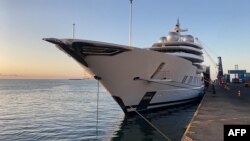Ukrainian officials said Monday that Russian forces attacked overnight with drones and a cruise missile that targeted different parts of the country.
Ukraine’s air force said it downed all 14 attack drones, including 13 Iranian-made Shahed drones, as well as the cruise missile.
Oleh Kiper, the regional governor of Odesa, said debris from one of the destroyed drones fell on the southern region, damaging a port warehouse.
Kiper said there were no casualties reported.
Russia has repeatedly targeted Odesa with aerial attacks, including ports along the Black Sea and the Danube River.
Ukraine’s Interior Ministry said on Telegram that the latest Russian attacks targeted the southern, eastern and central parts of the country.
Russian oil trading above price cap
Russia's benchmark oil — often exported with Western ships required to obey sanctions — has traded above the $60 per barrel price cap set by Ukraine’s allies since mid-July, pumping hundreds of millions of dollars a day into the Kremlin's war chest, The Associated Press reports.
Cracking down on Russia’s oil profits “is the one thing that hits Russian macroeconomic stability the most," said Benjamin Hilgenstock, senior economist at the Kyiv School of Economics, which advises the Ukrainian government.
Oil income lies at the heart of Russia’s economy, allowing President Vladimir Putin to pour money into his military while staving off inflation for everyday people and a currency collapse.
Moscow's ability to sell more to the world than it buys means it's weathering sanctions far better than expected. Its economy will grow this year while Germany's shrinks, according to the International Monetary Fund.
The price cap on Russia’s oil is supposed to limit what Russia can earn without taking its supplies off the market. Doing that could create an oil shortage that could drive up fuel costs and inflation in the United States and Europe.
However, honoring the price cap on Russia’s oil requires only a good-faith disclosure on a simple, one-page document with the names of the parties and the price. The actual sales contracts don't have to be revealed, AP reports.
Analysts say this lack of transparency has been an invitation for unscrupulous sellers to fudge — and for some shippers to adopt a see-no-evil approach.
Biden combines funding requests
As the infighting among Republicans in the House of Representative continues, leaving the House chamber leaderless, President Joe Biden’s $106 billion funding request for Ukraine, Israel and the U.S.-Mexico border remains on the table.
According to Reuters, Biden has rolled all those items together, but Republicans may try to break them up, as they are divided over further support for Ukraine.
U.S. seeks forfeiture of oligarch’s yacht
The United States sought Monday the forfeiture of a $300 million superyacht it says belongs to billionaire Russian oligarch Suleiman Kerimov, who is under U.S. sanctions.
Authorities in Fiji sequestered the 106-meter Amadea yacht pursuant to a U.S. warrant in May 2022 as Washington ramped up sanctions enforcement against people close to Putin, to pressure Moscow to halt its war against Ukraine.
The U.S. petition, filed in federal court in Manhattan, starts a potentially long judicial process in which the United States would seek ownership of the yacht, which is docked in San Diego, California, and then likely auction it and transfer the proceeds to Ukraine.
Some information for this story came from Reuters and The Associated Press.







